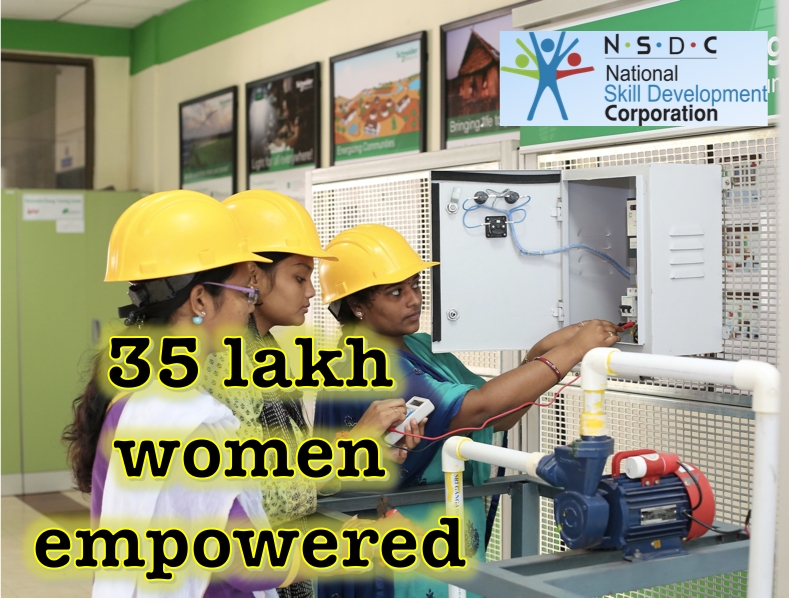The skill training and development initiatives are aimed at providing better livelihood, security and financial independence.
Commemorating International Women’s Day, Skill India salutes the grit, determination and aspirations of women across India, who are determined to change their lives through skill training. Since its launch in July 2015, the Skill India Mission, a mega drive initiated by the Ministry of Skill Development and Entrepreneurship (MSDE), has transformed the lives of over 35.56 lakh women through skill training; empowering them for a better and secured livelihood.
With a multi-pronged approach to improving employability and income-earning opportunities, enhancing financial security and promoting sustainable development and livelihood, MSDE, through its various schemes and initiatives, is working to reinforce equality via skill development.
MSDE’s flagship scheme—Pradhan Mantri Kaushal Vikas Yojna (PMKVY)—in its two phases, has achieved an incredible milestone of 17.72 lakh women trainings, including 8.63 lakh trainings under PMKVY-1 (July 2015–June 2016) and 9.09 lakh under PMKVY-2 (July 2016 till date).
With emphasis on women’s empowerment and improvement in employment opportunities, the scheme being implemented by the National Skill Development Corporation (NSDC), encompasses skill development via short-term training programmes, special projects and recognition of prior learning, covering over 250 courses. The scheme has witnessed proportionate enrolment of women (1:1). The employment numbers are equally commendable with over 50 per cent of the trained women securing placement as well.
Some of the women-centric projects have offered training in carpet weaving in Rajasthan (Jaipur Rugs Foundation), dairy and poultry farming (pan-India), bakery and apparel training for the Bru-Tribe (North East), and retail programme for Amazon Meri Saheli (North East).
NSDC, the executive arm of MSDE, has also been executing fee-based trainings via its wide network of more than 350 training partners. The organisation has been instrumental in training more than 16 lakh women in the short- and long-term courses (three months to one year), accounting for more than 40 per cent women amongst the total trained candidates. Some of the prominent choices of skill training for women have been IT and ITES, banking and financial services, building, construction and real-estate services, education and skill development services, textiles and clothing, electronics and IT hardware, beauty and wellness, healthcare and retail.
The Directorate General of Training (DGT), an apex body under MSDE, which works towards the development and coordination of vocational training and employment services at the national level, has trained over 1.84 lakh women candidates from 2015 till date.
KP Krishnan, secretary, MSDE, says, “Women form a significant proportion of the workforce in the country. We believe skill training will be vital in addressing some of the most pressing challenges related to inclusion, gender equality and access. Cognizant of our responsibility, we are working towards empowering women, enabling them to emerge as drivers of the social and economic well-being of their families.”
“We would urge women to come forward to acquire new skills, build entrepreneurship abilities and chalk out their own destiny,” he adds.
To make the skill development process aspirational, accommodating and flexible, so as to encourage women to enrol, there has been enhanced focus on soft skills, entrepreneurship, and financial and digital literacy under the Skill India schemes and programmes. Women have been encouraged to opt for courses of their interest. Some of these job roles, which were conventionally male-dominated, have garnered immense interest among women, including CNC mechanics, automation specialist, warehouse packer, mine welder, tool and die-maker, unarmed security guard and vermicompost producer.
The target of productively employing workers is gigantic in India, and stronger efforts are needed to include women to achieve these goals at a high rate and to create a deep impa



